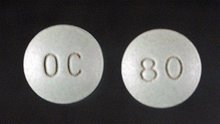I've recently been conducting research for my book about OxyContin, and my subsequent treatment with Suboxone. This entails digging up books, and articles from medical journals, the Internet, and the library at the university near my home.
One of the documents I recently examined is 365 pages long and carries the ridiculous title, "Medication Assisted Treatment for Opioid Addiction in Opioid Treatment Programs: A Treatment Improvement Protocol." The document seeks to instruct doctors on how addicts should be handled when submitting themselves for treatment with Methadone or Suboxone.
As you might have already suspected, this document was written by the U.S. Government. It is published by an organization that is as complex as the silly title of the document. It is published by "The Substance Abuse and Mental Health Services Administration, Center for Substance Abuse Treatment, of the U.S. Department of Health and Human Services."
The document (which is really more of a book) describes how every doctor, in every clinic, should handle every junkie who comes through their door. A committee of no fewer than 20 names, each foll wed by M.D. or PhD, claim credit for writing this fun little paper. The document describes how dope fiends like me should be inspected, detected, injected, dejected, rejected, signed, sealed, delivered, and blah, blah, blah. I wonder how many of the people on the committee have ever been a patient at a an opioid treatment clinic (or whatever the hell they are calling it).
Here's what strikes me: When I went to see my doctor about Suboxone, he and I went into an exam room, shut the door, and talked about my drug problem. Together we created a plan that we hoped would work. It did. Now I'm done. We never once referred to the government's protocol for how I should be screened, tested, interrogated, etc. Like any other disease, my doctor and I decided how to treat it, and we did it without any help from the government.
I wouldn't recommend it, but for the curious, anyone can take a look at the government's silly book yourself. It's available in PDF format at http://www.ncbi.nlm.nih.gov/books/bv.fcgi?rid=hstat5.chapter.82676 .
Treating people like me is a big business. I wonder how many people the government employs to decide how my drug problem should be handled. I wonder how much that costs. Add all of those people to the thousands who work at public and private treatment centers, and you get the idea.
What would the world be like if everyone who had a drug problem could just go to a doctor and get treated like any other disease? I can hear those thousands of people in the "treatment industry" screaming that such a thing just isn't possible. But for them, I have some chilling, shocking news.
Someday they may be obsolete.
My shrink just came back from a conference where future methods of treatment were discussed. One of the items is what they are calling "Addiction Vaccination." That's right. By creating killed viruses that resemble, say an opioid molecule, and injecting it into your bloodstream, your body will develop antibodies to the opioid. Get vaccinated for Oxy, go out and snort an 80, and before you know it, your body thinks you are infected with a disease and sends out cells that eat the drug and eliminate it.
Yeah, o.k., so that's pretty futuristic, but it's going to happen. Why? Because the smart money is betting on treating my drug habit just like any other damn ailment that might befall me. Not to mention the fact that the drug companies who will develop this futuristic treatment have already figured out that the "treatment industry" is chock full of cash, making it a great place to take away some market share.
I can't wait to get my shot.
Subscribe to:
Post Comments (Atom)
About this Blog
For the past ten years I have been writing about my experience using oxycodone, the active ingredient in OxyContin, Percocet, and other prescription painkillers. I eventually developed a tolerance, then dependence, and became addicted. My archive covers my abuse of these drugs and my effors to quit using them.
I have tried to accurately report my experience without a sense of advocacy. It is my hope that you'll be able to make your own conclusions, as well as find my story factual, informative, and interesting.
I have tried to accurately report my experience without a sense of advocacy. It is my hope that you'll be able to make your own conclusions, as well as find my story factual, informative, and interesting.
Oxy Archive
- June 2004 (3)
- July 2004 (2)
- August 2005 (1)
- October 2005 (3)
- November 2005 (1)
- March 2006 (1)
- April 2006 (1)
- May 2006 (2)
- March 2007 (1)
- April 2007 (1)
- May 2007 (1)
- June 2007 (4)
- July 2007 (3)
- August 2007 (1)
- June 2008 (1)
- July 2008 (1)
- October 2008 (1)
- February 2013 (1)
- June 2014 (1)

1 comment:
Interesting assessment of the government's possible need to make money off drugs..
Post a Comment